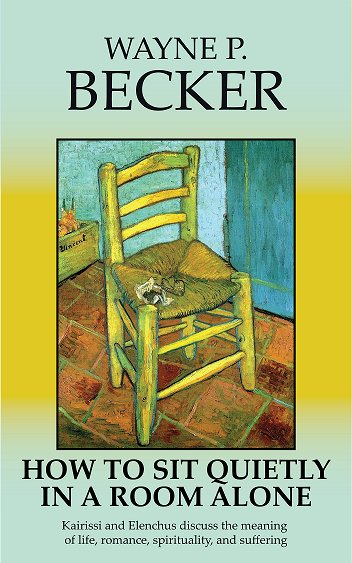|
Word Gems
exploring self-realization, sacred personhood, and full humanity
Editor's 1-Minute Essay:
Spirituality, Part I
return to "Spirituality" main-page
J. Robert Oppenheimer, physicist, The Manhattan Project: “When we deny the EVIL within ourselves, we dehumanize ourselves, and we deprive ourselves not only of our own destiny but of any possibility of dealing with the EVIL of others.”
As a young man in the early 1970s, I spent some time at a Bible college in England. My original purpose in attending was to explore the mysteries and, what I hoped would be, the truth of the Bible.
After some time, while I did not give up my academic goals, I found myself being drawn into a certain spirit of competition regarding being selected for work in the ministry. To that end, I decided that it would not hurt my “resume” if I were to volunteer for a charitable-works project. I should add, in my defense, that serving the disadvantaged did, in fact, constitute a real interest for me; however, in retrospect, I now see that any altruistic motive I might have had began to be swallowed up by a desire “to be noticed.”
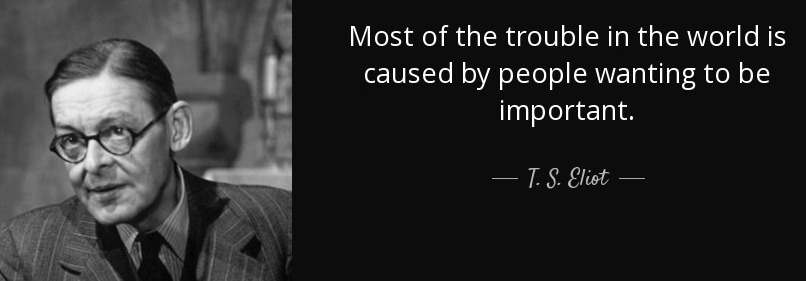
Near the college campus lived a very elderly couple, a Mr. and Mrs. Dunham. Frail and somewhat incapacitated, these quite aged seniors could not make their own meals nor tend to a living-room fireplace. And so, each morning before class, for some months, I visited them and provided a measure of custodial care.
At the surface of life, it might have appeared to the world that I was engaged in a small but noble enterprise; however, my heart’s motivation had been compromised, and this exercise in seeming-humanitarianism did not end well for me. Eventually, I perceived that my efforts were viewed by my superiors with less esteem than that for which I’d bargained. I became angry by this slighting and dropped out of the program.
Editor’s note: This lack of fanfare by the hierarchy, I would later understand, issued as purposeful denigration. I will share a little story. Three years later, at graduation, to determine if I might be selected for the ministry, I sat before an inquiry board of leading elders of the church. Many of the men I did not know, had never met, and they knew nothing of me; however, one man on the board I knew too well. All during college, whenever he had the chance, he would try to insult me. In his classes, I tended to be at the top, which he didn’t like. At times, during class, after I’d asked a question, he’d hold me up for ridicule to the other students, attempting to make the subliminal case just how stupid I was. It wasn’t long before I figured out that he was very threatened by me. And so, to my great chagrin, when I saw that he was on the new-minister selection board, I knew right away they wouldn’t hire me. The problem for the board, however, is that I’d conducted myself well in college, and was considered by many to be a fine student, a capable intellect, and a good person. And so my adversary was in a quandary regarding how to “poison the well” concerning my reputation. He had his big chance, though, when I was asked the question, “How do you think you did on the general Bible-knowledge test? above average or below?” (The test had recently been administered to hopeful hirees.) I knew I’d done well, because I’d spent so much time in college in my studies, desiring greatly to become proficient in this area, and so I said, with confidence, “above average.” After my pronouncement, there was some hushed huddling among the group, a conference in camera. Finally, and I believe it was my adversary who spoke for the group, “Your grade was below average.” This stunned me. I knew this couldn’t be possible. I was the one laboring over the books when so many of my peers were whiling away their time. It’s funny, this happened almost 50 years ago, and I still remember my attempt to deflect as best I could: “Well, I guess I’ll have to revise the ego-image of myself.” My adversary, however, leapt on this as an example of my out-of-touch sense of things. After this attack, it was all downhill. Several pleasantries and non-essentials were exchanged, but I knew it was over. They’d found their reason. But – and here’s the big irony -- just before the interview was over, as I was about to “turn into a pumpkin” and be thrown to the wind, a young aide-de-camp entered the "final-judgment hall." He made his way to the chairman of the group and whispered something in his ear. The chairman now, with grave tone and furrowed brow, announces, “You, in fact, scored above average on the test!” The real truth, I’m certain, is that -- not just "above average" but -- I did very well, and probably better than most of these men would have done. But, the facts didn't matter, and no one was in a mood to congratulate, apologize, or offer commendation. Not a word of solace was forthcoming. How strange. I had just invested four years working very hard to prepare myself to serve the people of the church, but, at the end, I'd been unjustly interrogated by a kangaroo court, was vilified with a Fake News Report, and now, my allotted interview-time having expired, they would dismiss me, unceremoniously send me on my way, without cause or justification, and not allow for another hearing. Well, in those days, I needed this too much. I needed the approval of others to feel good about myself. Most young, immature men live in that mindset (older ones, too). In retrospect, it was all for the best; as the "Course In Miracles" consoles, "All things are lessons God would have us learn." The higher-ups would have hated me in the ministry. I thought too much, knew too much, felt too much. I would have been miserable under their rule, and so I feel I dodged a bullet. In any case, as further study would reveal, the church doctrines were fraught with error, an utter misperception of reality, and it was just a matter of time before I’d have to resign. End of my "fractured fairy-tale."
|
Editor's note:
On the “Person” page, I’ve posted quotes by Ibsen and Rolland instructing, for those spiritually maturing, that there are times when, having received a “green light” of confirmation from one’s internal guidance system, one is required to stand alone with one’s spirit-tested ideas; if need be, against all the world.
Even if we’re right in our assessments, we don’t like to be the odd-man-out. We weren’t made for that, to make waves. We were made to live in harmonious community with others. However, in this world of illusion, error, and egoism, cordial affability with society might often escape us.
In this vein, consider the words of Elizabeth Fry in the spirit world; how, she said, no one in her service group wants to overrule another, no one wants to play the big-shot and claim to be a know-it-all, and that everyone in their group is very aware of what really matters, their sense of oneness and unity. This is the natural way to live with brothers and sisters. Even so, as part of our education during our tour of duty "down" here in “hell,” we may be called upon to exit our comfort zone and make a stand for the truth.
T.S. Eliot had it spot on: The poisonous trouble in our world is caused by people wanting to make a name for themselves, to be considered "better," wanting to appear important, wanting to assuage the inner neediness with the applause of the mob. Good luck to us with that plan.

In this triad of spirituality articles, I will be restating, a few times, what I say here in this inset box. It can’t be overemphasized. Because those who are caught in the blinding glare of the headlights of the ego’s craving to be noticed, to be considered important, will unsettle their lives to a degree which, in many cases, will not even allow for enough coherency to assess the self-damage until well into the next life. What I mean is, the spiritually immature will injure themselves, such that, the first order of business upon crossing over will be simply that of regaining themselves, recalling to themselves at least a small measure of sanity, of “getting back to zero,” with so much of their happiness having been forfeited and lost to the ego’s schemes and grandstanding while in this world.
When we structure our lives – be it on a business, hobby, church, or personal level – to be noticed, to garner the applause of the mob, to canvass for support, we will not be able to hear the “still small voice within.”

"You don't care what people think of you?
"No."
During this time of unbalance, we fancy ourselves to be strong, in charge, able; but, the truth is, we do not even own ourselves as we need the accolades of others too much. We don’t feel good about ourselves without the “gold star” affirmations, the "atta-boys," the "wow, you're so talented." In reality, we mask a sense of inferiority with a blustering busy self-promotion of “this is what I’ve accomplished and you should be so impressed with me.” No good can come from this. A day of existential crisis has our name on it and is speeding its way to us with all haste.
The biggest curse and infirmity during this phase of egoic insanity is that, if true love somehow manages to come calling in one’s life, we will not recognize the savior. If he tells you that you are all the world to him, you will not be able to accept his profferings of unconditional love. You will hate him, as you see it, for this hubris. The inner neediness, the sense of inferiority, the self-loathing, will just make you mad when he tells you how wonderful you are. But, like a prophet heralding a message before the time, he perceives what you are meant and destined to become, but the ego will not allow you to receive the truth of what his soul knows.
The purpose of the Dark Realms is not to punish but to slow people down, forcing them to a quiet mode, wherein, probably, for the first time in their lives, they will begin to see how they traded the proverbial "magic beans" for the love that was meant to save them.
|
What does it mean to be a spiritual person?
There are many voices in the field of afterlife research. And one of the topics often discussed, in this world and the next, concerns how we shall advance ourselves spiritually; in other words, what does it mean to become a truly mature, spiritual person?
Some remedies concerning this question, very popular in most churches, assert that the “good person” will believe the right doctrines, follow the right religious leader, attend the right church, observe the right holy days and rituals. All this, discussed in other Word Gems articles, is readily dismissed as patent error by afterlife teachers, on this side and that.
However, there is an aspect of this discussion that deserves closer attention. One camp in the debate, the most vocal I would say, posits that the way forward is to engage in charitable service; that, good works, per se, will mature us and “raise the vibrations” of one’s inner person.
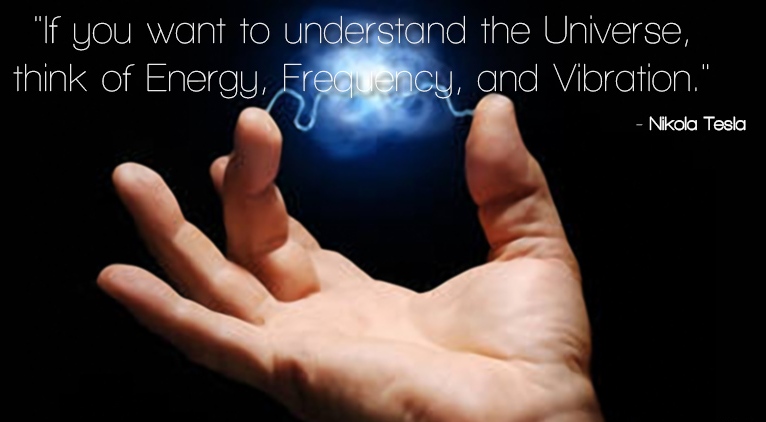
There is much to commend in this view; but, as I learned as a young man, without an additional element, charitable service might devolve to attempts at self-aggrandizement, come to nothing, and even make one worse.
borrowing a concept from Kant
In the “Experience” article, we find Kant sorting through much confusion with his statement, to the effect, “our knowledge arises from experience, but is not grounded in experience.” What a great insight, and we must borrow it now for our purpose at hand.
Our spirituality will arise from good works, but is not grounded in good works.
What does this mean? It means that good works, properly motivated, will assuredly “raise one’s vibrations” and advance us spiritually. All open-eyed citizens of Summerland are actively engaged in some form of helping and serving. But, without that proper motivation, a necessary foundation and "grounding," there will be no spiritual growth from doing good works.
Stated another way, virtue cannot be “added” to one’s essential self when motivations are Machiavellian in nature. If we set to work on our charitable mission with political gain in mind, we might win the temporary favor of the crowd, but there will be no virtue, no true advancement, in such activity – as Jesus used the phrase, “you've already received your reward.”
We cannot, assuredly, engage in good works for the purpose of “gaining reward” -- even the reward of our own maturity -- and expect the soul to evolve. The truly spiritual person works for the simple joy of service, of helping one’s brothers and sisters, and this, for its own sake - external payment never enters the equation.
What is the “grounding” of spirituality; what does it mean to be a truly good person?
The “grounding,” as intimated above, is the “proper motivation.” And this proper motivation comes by way of accessing the “true self” along with “God within” one’s deepest person.
- John 5:30 "By myself I can do nothing" (NIV)
We, too, can "do nothing" truly spiritual unless we access God within, on which we might base our lives and work.
At that foundational level of being, we discover a joy of living, of knowing God, of simply existing. From that sure and solid basis, living from one's "center," good works naturally flow and express themselves – this is the “arises from” element of the Kantian process; and the "naturally flowing" part is pictured in Jesus' "artesian spring of eternal life" (John 4).
for the truly spiritual, there is no element of necessity or requirement in serving others
There will be times when the spiritual person is very much engaged in good works; at other times, however, he or she will do nothing but enjoy life on one’s own terms. There is no element of necessity or requirement associated with serving others, with being a "good person." Service is not to be used to mask an inner disquietude, a sense of guilt, concerning some skewed notion of unworthiness, of not measuring up, of not having done enough.
One’s spirituality is not grounded in “doing” but in “being”; otherwise our "goodness" would reside in making sure there's always a dependent, servile class around to keep us feeling good and pumped-up about ourselves - more Machiavellianism.
For advice on how to access the "true person" and "God within," the basis of spirituality, see Tolle's books:
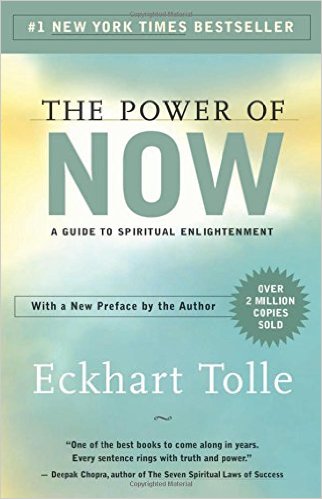 |
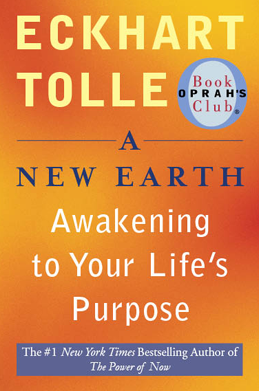 |
|
the great spiritual teachers do not talk about “kumbaya,” “let’s all join hands and sing,” or “if we can just get enough of us to band together, world utopia will inevitably be ours"
The great spiritual teachers of history speak of the solitary path to evolvement; of the bitter gall of denying the (false) self; of the difficult quest to discover the hidden inner riches; of entering a process of purging introspection, the “long dark night of the soul”; of accepting one’s “torture stake” of personal responsibility to follow the truth, in the face of adversity, wherever it leads.
Editor’s note: Please disregard everything I just said. It sounds like you have to become Superman and Hercules to attain true spirituality; not really. Jesus said his "burden is light and easy," and it is, once we get the hang of it. It's not about "doing" but "being." What we really need is one moment of cosmic clarity. As Bugs would say, “dat’s da ticket.” We become “spiritual” in “no time,” in a timeless world of the eternal present moment.
Well, it’s a hard sell to the mosh-pit crowd. Not much fun with a torture stake. But as our eyes open to the nature of authentic spirituality, we begin to discern between the true and false versions. Here’s an example of inauthentic spirituality.
We find this among those attempting to create a following for themselves. Those who posture spirituality will say things like,
“Let’s all join hands and sing, let's all try very hard, grit our teeth and huff-and-puff, to love our brothers and sisters, let's sprinkle the air with the stardust of good intentions, let’s bring peace and prosperity to the world by virtue of our efforts to band together in a spirit of fraternity.”
|
Editor's note:
The “stardust of good intentions” could be a help, if it were something real. But if this kind of talk issues from the dysfunctional ego, then it’s all empty words, just the ego posturing as a good person, an effort to aggrandize the “Little Me.” Politician-types mouth platitudes all the time, but, if they can get away with it, only on their way to imposing totalitarian policies. Read 1984. It's filled with “stardust of good intentions” terminology, as the powers-that-be subvert human rights.
|
Now, you might ask, what’s wrong with this? Should we not all lend ourselves to heroic altruism, should we not all strive to create a just and equitable society? It's a nice sentiment.
The better answer, however, is subtle and nuanced; or maybe not.
The problem with the confetti and hoopla fanfare of “let’s all join hands” is that some Needy Little Ego will want to lead that parade; some politician or budding cult-leader will try to take credit, make a name for him or herself, will attempt to put forth narrow and self-serving definitions of "morality," become our "savior," attempting to usher in a golden age of global fraternity.
|
more than drinking the koolaid
The long reach of cultism encompasses much more than crackpot churches. The root idea of cult offers the sense of "cut." This core concept of "cut" leads us to images of refinement and refashioning and, by extension, development, control, pattern, order, and system.
Cultism as systemization finds a ready home in religion and philosophy which seek to regulate and redistill the patterning and ordering of ideas. However, in a larger sense, the spirit of cultism extends to every facet of society. We find it scheming and sedulously at work in politics, academia, family, corporations, entertainment, science, artistry – anywhere power might be gained by capturing credulous and fear-based minds.
See the “cultism” page for a full discussion.

|
Historically, a plan of imposing utopia on others is but a short step from when the shooting starts.
T.S. Elliot, without equivocation, explained it to us:

Again, the great spiritual teachers of history do not talk about “kumbaya,” “let’s all join hands and sing,” or “if we can just get enough of us to band together, world utopia will inevitably be ours." There's not a particle of that in their teachings. Only politician-types, those with an agenda -- but not in your favor -- talk that way. They want to emphasize "doing" because they have no concept of "being." As Tolle wryly puts it: "Being? - what do you do with it?"
It should also be stated that some of the “kumbaya” proponents are sincere and well-intentioned. They believe in “let’s all join hands.” Why do they believe it? They believe it because they themselves have not descended deeply enough, have not embarked upon the journey to the center of self. They believe in "doing" because "being" has no meaning for them. As such, their evaluations of the human condition remain unrealistic and naïve. They have not met themselves, up close; when they do, they’ll hang up their pom-poms.
Our present lack of world peace, or local community peace, or family peace, or personal sense of peace, is not caused by the absence of the right political movement, the right church to attend, the right slogans to chant, or any of these cultish externalities. We don’t have to try very hard to bring about world peace. It will happen naturally, easily, with no effort at all – as soon as we, individually, enter upon the severe path of sacred introspection -- and this, in a hot moment of clarity.
When we do, we will find, huddled in the shadows, a needy little ego, the false self, suffering in the darkness, laboring under delusions of “I do not have enough” because “I am not enough.” This is the primary error and misperception. Shining a spotlight of awareness on this internal disquietude, a sacred “knowing of the self,” becomes the essence of authentic spirituality.
When the inner riches of the true self, the heritage of those “made in the image,” are finally discovered, all forms of peace -- world, community, family, and personal -- immediately and naturally flow, in abundance, from this shattering realization. To reference Jesus one more time, it is the artesian spring of eternal life (John 4), effortlessly, no work required, bubbling up to the surface of personhood.
|
|
we come to this world to “wake up,” to become an individuated person, to see ourselves realistically, not just as the “true self” but also the egoic “false self”
Adrian, just today, informed me of a recent ruling by the Supreme Court of Canada. It is shocking in its drift, indeed, now lurching, toward totalitarianism.
Upon learning of this, a Canadian law professor said that the first thing he felt like doing was to check his passport! – that is, was he still in the same freedom-loving country or had he somehow been wisked away to a place like North Korea?
What did he mean by this? Now, in Canada, the elites have defined an aspect of “morality,” which is not unusual for courts, but what is unusual, at least in advanced democratic countries, is “forced speech,” the requirement, the legal duty, to actually say and espouse certain positions.
The courts in Canada have actually mandated that attorneys and their staff-members must sign pledges that they “agree” with certain narrow definitions of morality, as defined by the High Court, or lose their law licenses!!
altogether now, chant to Dear Leader, make sure you smile, too
The law professor, outraged by this power-grab, an attempt to “buy votes” for one political party, said, to the effect, “The government has the right to impose speed-limit laws and rates of taxation on its citizens, and those living in Canada have a duty to obey these laws. But since when has it become a crime for people to say ‘I disagree with the current speed law,’ or ‘I disagree with the rate of taxation’? Since when must all citizens bow before Dear Leader, offer servile obeisance, and mindlessly chant, with plastic smile, how wonderful are his laws and policies?’” O, King, live forever!
Do you see the problem here? This is a blatant and naked power-grabbing on the part of the courts to unjustly rule over the citizens of Canada in totalitarian fashion -- a destruction of the very fabric of democratic, rational, rule-of-law society.
It’s also happening in Britain. And it’s happening in the US, as well, with the “political correctness” movement, which, thankfully, has been dealt severe blows of late by courageous statesmen.
I told Adrian, “One gasps in astonishment at the rate of societal deterioration. The ‘forced speech’ policy, the de facto requirement to ‘say that a speed limit and paying taxes is a good thing,’ is clearly North-Korean stuff, of Dear Leader mentality. One can only feel utter dismay to consider how far this [power grab] will go before it manifests as blood in the streets, which, historically has been the result in these situations."
Why is this the result? Because once the insanity rises to this in-your-face level, once adversaries begin to taste this kind of "victory," they don't tend to back down, they don't easily give back the power. Bloody wars and revolutions might begin this way. We'll see how this develops.
Why we came to this planet: Part II
We come here, in a phrase, for the "aversion therapy," leading to new points of view.
My purpose in speaking of these things is not to offer a current-events lesson but to point out an underlying issue. When I shared the information above with a friend, she immediately lamented, “I’m glad I won’t be in this world much longer. It’s become too bad.”
This is not an unreasonable response given the abridgment of liberties at hand. However, in all of this chaos, a certain “divine plan” is being worked out, one element of which is to teach us that there is no end to the evil that the “false self” might engage in to fill up the existential neediness, the ever-demanding “I don’t have enough” because “I am not enough.”
Editor’s note: Kierkegaard spoke of being “instructed by dread” – the dread of mortality and knowing that we’re going to die, the dread of living in a bad world. Despite this lack of 5-star accommodation, we might be profitably instructed by it all. If we face life without repressing ourselves, that is, with eyes wide open, “the dread” can serve as catalyst to enlightenment.
Footnote: I received a late-night text from a friend who had been counseling one burdened with suicidal thoughts. I responded with the following, a good reminder to myself:
I awakened in the night, saw your note, and it prompted some thinking. Kierkegaard, who also knew suicidal thoughts, used the phrase “instructed by dread,” in that, if one manages to climb out of the pit, there are certain benefits. I think we advance spiritually, much more, by having visited the dark side of one’s nature than the days of pollyanna’s all sunshine and light. I am reminded of my own descent into hell: over ten years ago, I was in MPLS, alone, ill, unable to walk, no money, having been betrayed, and I woke up one morning wondering if I should just allow myself to drift into coma and be done. And I think anyone who desires to live the life of a servant, maybe more so in the future, realizes that one’s experiences of having entered the black pit of hopelessness are a required course for graduation. Without this journey to the center of hell we become unrealistic, we espouse shallow philosophies, such as “if you keep the law, you will be blessed” – apparently some of the suffering “heroes of faith” of Hebrews 11 missed this memo – and we become brittle, glassy-eyed, and of little use to the suffering ones. Among the many channeled afterlife reports, one I particularly like is from a Spirit Guide, a missionary in the Dark Realms, who says that the novice servant-in-training ought to be motivated by the realization, “as you have been strengthened and taught, so do you feel bound by the obligations of gratitude and ties of universal brotherhood to help others.” Without this sense of shared human frailty, we fall into the trap of unrealistic haughtiness of the man in the temple in Jesus’ story: “I thank thee Lord that I am not like other men.” And I can think of more than one afterlife report from those thus plagued who otherwise offer good information but, unbeknownst even to themselves, have limited their own usefulness by thoughts of pride, to the effect, “that unpleasant person can be avoided, he’s getting just what he deserves”, and this may be true, but in this holier-than-thou assessment, there is no sense of “obligation of gratitude,” no “tie of universal brotherhood,” having been fostered by receipt of one’s own frail self having been rescued. And in that icy disposition of “I am better,” what good are we to the Great Spirit in terms of bringing in the harvest? – not much. Well, this is my sermon at 4 AM, and I’m going to send it now, let me know if it “beeps” and wakes you, as I will refrain from such impropriety in the future. W.
We come to this world to “wake up.” I've spoken of this, referencing Spirit Guide Abu's teaching (see "Prometheus"). But part of waking up is seeing just how wicked the “heart of darkness” might become.
There is no degree of wickedness that any unenlightened person, under sufficient provocation, with unbridled power at his disposal, might not allow; any crime, any atrocity, any perversion, by any person – if sufficiently threatened and deluded.
This “bottomless pit” of egoic dysfunction, while more than a little unpleasant, is also part of our salvation. It’s to be the first step in our healing, in that, before we can become a truly good person, we must plumb the depths of our own darkened hearts, the “false self,” and from this basis we will no longer be deceived about any self-evaluations of elitism, of “I’m better than you.”
By way of ensuing contrast, we come to this world, this severe classroom, to see how precious, how excellent, is the divine consciousness, the mind of God, which might be accessed in a moment by going within, and meeting the “true self.”
But, most do not believe that it’s precious; and we don’t really believe that our (false-self) hearts are all that bad – "Well, maybe, a little something, but I’m really not such a bad egg. Now, those other people, you know the ones, if we could just get rid of them, all of our problems would go away and life would be good. But you and me are ok.”
This is the illusion – that you, or I, or your best friend, or the Nice Young Man at Church, or your dear Uncle Fred, or the sweet little old lady next door, could not be tainted by “the insanity.”
As long as we remain in this kind of sightless denial, a shallowness will envelop us, true spirituality will evade us -- Kierkegaard called it a "philistinism," a "shut-upness" -- leaving us, with glassy eyes, to join hands and sing kumbaya in the darkness.
|
|
the purpose of the brain is to filter out, from universal consciousness, anything not correlating with the body’s perspective; in this ‘step-down transformer’ process, separate egos, with separate personal identities, emerge

Dr. Bernardo Kastrup, PhD philosophy, PhD computer science, for many years worked at CERN, the large hadron collider in Geneva.
“… the function of the brain is to localize consciousness, pinning it to the space-time reference point implied by the physical body. In doing so, the brain modulates conscious perception in accordance with the perspective of the body.
a brain that filters implies the existence of unbound mind, a universal consciousness
"When not subject to this localization and modulation mechanism, mind is unbound: it entails consciousness of all there is across space, time, and perhaps beyond. Therefore, by localizing mind, the brain also ‘filters out’ of consciousness anything that is not correlated with the body’s perspective… like a radio receiver selecting [a particular station], among the variety [with] all other stations being filtered out and never reaching the consciousness of the listener…
"[T]he filter hypothesis implies that consciousness, in its unfiltered state, is unbound. As such, consciousness must be fundamentally unitary and non-individualized, for separateness and individualization entail boundaries.
Editor’s note: Father Benson from the afterlife speaks of a being, formerly mortal, five billion years old, so advanced as to enjoy awareness of all life-forms in the universe; in this, we see the future of the ‘unfiltered’ mind. Read More on the “500 hundred tape-recorded messages from the other side” page.
the filtering brain creates the illusion of separateness, of disconnected personal egos
"The emergence of multiple, separate and different conscious perspectives or egos, is a consequence of the filtering and localization process: different egos, entailing different perspectives on space-time, retain awareness of different subsets of all potential subjective experiences, the rest being filtered out. It is the difference across subsets that give each ego its idiosyncratic vantage point, personal history, and sense of personal identity.
Editor’s note: A brain designed to filter, and reduce to a trickle, experience does not substantively support a theory of reincarnation which exalts much experience. We do not come to this planet to gain experience, as such, but to individualize, to transform one’s tiny sub-set of universal consciousness into a personal ego. With this, we become ready for what comes next in the afterlife, even if we are not yet “good” persons, which can be accomplished later, but only after one becomes a person in one’s own right. Read More on this need for individualization.
"The subjective experiences that are filtered out become the so-called ‘unconscious’ mind of the respective ego. Since each ego allows in only an infinitesimally small part of all potential experiences … the ‘unconscious’ minds of different egos will differ only minimally… As such, the filter hypothesis, unlike materialism, predicts the existence of a ‘collective unconscious’; a shared repository of potential experiences that far transcends mere genetic predispositions of a species…
the likely origin of the mystical experience
"[A]nd most importantly, the filter hypothesis predicts that one can have experiences that do not correlate with one’s brain states. Since here the brain is seen merely as a mechanism for filtering out experience … when this [filtering] mechanism is interfered with so as to be partially or temporarily deactivated, one’s subjective experience could delocalize, expand beyond the body in time and space, and perhaps even beyond time and space [giving rise to what is called the mystical experience]…”
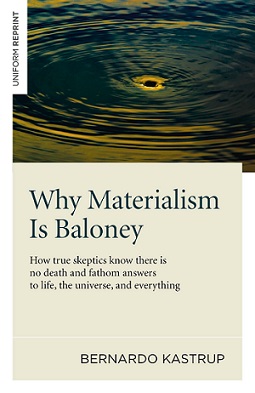
READ MORE of Dr. Kastrup's work on the “quantum mechanics” page
|
|
Brother John of Glastonbury: a person may develop a fine character of serving the needy, even suffering for them, but, at the same time, remain spiritually immature, if good works are not based upon a realization of the inner spirit, the true self
The 500 Leslie Flint "direct voice" tape-recordings include a testimony by Brother John of Glastonbury (1393-1464 CE), a former monk during his Earth-life.
John begins his talk by saying that we come to the Earth to develop character. With this opening statement, we might assume we'll be offered instruction on the cultivation of good traits and habits, work ethic and the like. John acknowledges these as good things, but then takes it all away by saying that unless these good efforts and works are subsumed by a realization of the inner spirit, the "true self," then we haven’t yet begun to understand what’s important.
Here is a rough transcript of Brother John's teaching, a discourse on "being" versus "doing"; also note, John uses the religious term "spirit" as an equivalent of "consciousness" or "the purified consciousness":
“We came to Earth to develop character”; but, he says, unless good works and good character are subsumed by a "realization of spirit, a motivation of spirit [the 'true self'], underlying all of one's actions… unless one realizes and perceives a spiritual motivation behind all that is good, then one has not achieved what one might have achieved with one's character. Though these 'good' people do much that is of the heart to help the disadvantaged, though they strive in many ways to uplift others, and though they sacrifice themselves in consequence, even so, many of these souls, 'good' though they may be and are, have not a realization of the power of the … spirit, they are not evolving, as it were, in the fullest sense. One may evolve as a [disciplined] person in a material sense, work very hard at it, and to a very high level, and yet not necessarily evolve very much on a spiritual level. And this brings me to the subject of mediumship. So few mediums are on, what one would term, a spiritual level. Most mediums -- 'good' though they may well be -- are on a material level; sincere, anxious to serve, anxious to please, anxious to do all that is right, and just, and honorable, and to give comfort to those who are sad, alone, and depressed, and sick, and yet do not realize the potential of the spirit within them [the 'true self'], are not aware of the power of the spirit... and so when we speak of character development we should also include this spiritual aspect."
In other words, they remain in shallowness, immaturity, despite their "good works" and their apparent "good heart."
For further discussion of the importance of hidden motivation of one's actions see the "Morality" page.
|
|
to be a 'spiritual' person is to align one's heart, soul, and spirit with the Source of Spirit
How do we do this? - see the "simply notice" writing.
|
|
a mature spirituality will be founded upon, not just the ‘true self,’ not merely the perception of light and goodness within but, an acknowledgement of the ‘false self,’ the heart of darkness, the seeds of evil, within each human being
The following channeled testimony was facilitated by the mediumship of Mrs. Elizabeth Sweet, as reported in “The Future Life” (1855).
A guide conducts an immature spirit-person on a tour of the Dark Realms. It’s not a pleasant experience and the younger one wants to turn back:
you need to be willing to observe your own dark side
“There was no feeling of joy at my heart—no anxious hope, but a dull, heavy sensation pervaded my entire brain, and I said to my guide, ‘Let us return; these regions are not the abode of happy spirits, because, instead of warming or exhilarating my frame by their near approach, they chill and subdue me.’ My guide said, 'Nay, thou didst wish to look into things pertaining to the eternal welfare and destiny of man. Why, then, art thou unwilling to look upon the dark side? because there thou mayest learn as much of wisdom for thy spirit's strength, as thou couldst gain by gazing upon the holy beauty, which thou art not yet prepared to enter.’”
|
|
Editor's last word:
J. Robert Oppenheimer, physicist, The Manhattan Project: “When we deny the EVIL within ourselves, we dehumanize ourselves, and we deprive ourselves not only of our own destiny but of any possibility of dealing with the EVIL of others.”
Each person must enter into the depths of one's own "heart of darkness." We cannot escape an existential responsibility to know ourselves. There can be no true spirituality until such discomfiting process is accepted; to do otherwise, to validate the clamorings of the "false self," is to cling to a brittle and fragile self-image of the "good person," rooted in pride. It is to sing a theme song of "I thank thee Lord that I am not like other men" with its totalitarian leanings.
But we have a choice. We can presently agree with ourselves to allow this sacred introspection, but, if not, our higher selves will finally demand it of us upon crossing over into "the real world."
|
|






